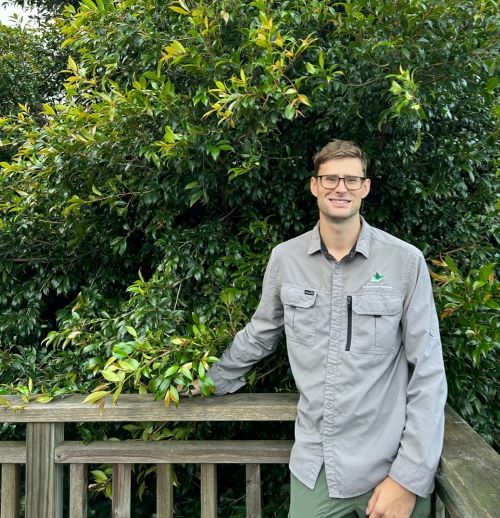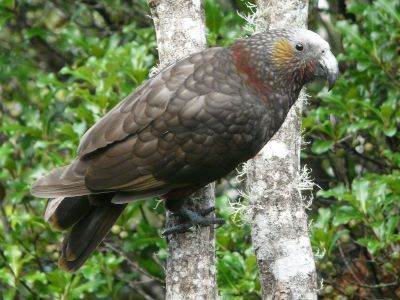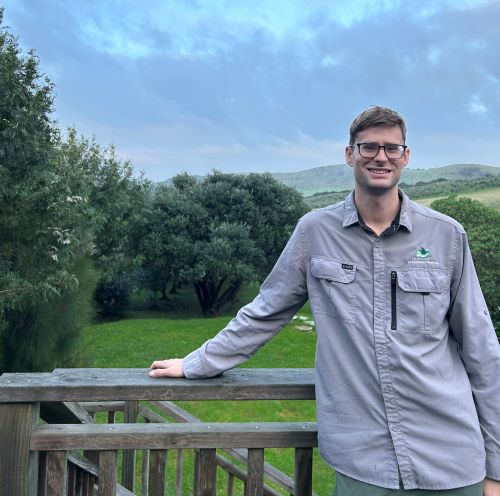Passion for conservation

Conservation underlines all marine and environmental sciences AUT graduate Harri Raby does and dreams of doing - and that means right now he is working to eradicate predators from Waiheke Island.
Striding across remote corners of Waiheke Island servicing predator traps and bait stations is a job that fills marine and environmental science graduate Harri Raby with satisfaction.
“I love how I get home and I’m physically tired, but it is a good satisfying feeling that I wouldn’t get if I was behind a desk all day and getting a headache from reading screens,” he declares.
Harri is a field technician for Te Korowai o Waiheke, a charitable trust set up by the local Waiheke community to eradicate predators on Waiheke Island.
He is proud he was part of the stoat team that has trapped 171 stoats since the stoat eradication began in 2020. He’s currently part of the rat team, which is conducting an operational trial in Oneroa, Waiheke.
“It is special being part of the project and community and seeing the results, such as the increase of kaka (right) and other birds flying around the island. It’s a job where your physical and mental needs are met, and you’re out surrounded by green space, nature and birds.”
Now in the rat team, Harri is involved in placing, repairing and cleaning bait stations, checking what has been feeding in the stations, then entering that data into ArcGIS Field Maps.
“We also make chew cards and wax blocks to put around bait stations so we can analyse bite marks to see what species are hanging around,” says Harri, adding another major aspect of monitoring is setting and analysing up trail camera footage of the area.
Environmental and marine scientist focus
Harri was initially looking at a career as an environmental scientist, studying environmental science and GIS, but became interested in marine science after doing a couple of elective papers and switched GIS for marine science.
“I found I was doing better because I was more interested in it and so I was happy to put more time
and effort into it.”
A highlight was going on a summer scholarship as a marine science student to the Solomon Islands to investigate patterns in the species composition of fishes on fringing reefs near Vavanga, Kolombangara Island.
“Through this I realised the power of research and the endless possibilities it has. I like how information you collect can be a useful tool for helping local communities and flora and fauna, whether in the Solomons or elsewhere.”
Keen to further develop his research skills Harri continued into a master’s in marine science and is currently completing his thesis on the comparative analysis of snapper (Chrysophrys auratus) otolith microchemistry to ascertain early life fine-scale movement patterns.
Once completed, he will then consider what his next career step will be.
“I’m not sure if it will be land-based or marine conservation but I’m equally happy doing either,” says Harri.
Wealth of science skills developed
Harri says problem solving is a major and necessary skill.
“Every day is different in the field because there are so many different variables. Things may not go as you’re expecting, so being able to problem solve and adapt to different conditions is essential. You’ve got to be able to cope and manage that.”
Data collection and reporting data is also important, says Harri.
“Having a methodological or scientific approach really helps – and that is what I gained from a science degree. We are not just throwing everything at a problem to see what works but taking a systematic approach, so we really do know what does and doesn’t work.”
He also finds communication and collaboration skills are essential because, although he works solo during the day, he is in a team of field technicians that he collaborates and discusses strategy and progress with.
And while he chose not to continue with GIS as a major, he says his knowledge of it is extremely helpful and it is a very important tool for conservation and marine science.
Future career potential?
Harri is happy for now on Waiheke working with the trust and being part of the community where he lives with his partner and dog. However, he is also attracted to opportunities to go to more remote places for a period of time.
“You see so much more diversity and awesome species in more remote locations but whether I do that soon or later, I don’t know.”
He says there are also jobs in organisations like Auckland Council, MPI and NIWA where a lot of his peers are working.
“It depends on what you want. There are lots of options ahead of me, but I prefer being out in the field.”
Marine or land based?
Whether marine or land-based work, it is the conservation focus that matters for Harri.
“It is one whole ecosystem. Land use changes affect the marine environment and vice versa. Every time we alter the topography of the land it changes the hydrology flow and that alters fresh water and sediment impacting and entering the marine environment.”
Find out more about marine science and other sciences at AUT here.
Need help with career decisions?
AUT Employability and Career services can help you with career decisions and job search preparation. Sign into our online portal - Elab Online - and make an appointment online or in person with one of our employability and career specialists.
CVs/Cover letters
- 7 Tips on creating a great CV
- Personal Statement? Career Objective? What?
- Why bother with LinkedIn?
- Why bother to write a cover letter?
Job search skills
Career advice
- Bringing passion into the mix
- Don't let rejection end your dream
- Employability Skills - how to figure them out!